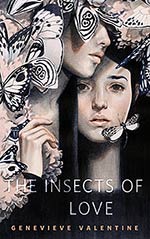
![]() mlwillingham
mlwillingham
10/3/2016
![]()
Soft, soft, soft - dream-like, deliberate, and enslaving all at once - that was my experience reading "The Insects of Love."
Something about this story really drew me in, and by the end of the first segment, Valentine's writing had already captured me. Most of the prose is understated but elegant, with bits of near-ethereal linguistic beauty woven throughout.
You only need one or two, if the area's small, but Fairuz never did anything small if she could help it; the tattoo was all over and so were the beetles.
They skittered back and forth over her skin, a shirt of rosy sequins, and across their bodies the projected constellations flickered in and out of sight.
Valentine separates each section of this story in a way that is reminiscent of memories playing out in strips of home-shot film, colored both by time and by Soraya's previous experiences. They are ambient and fluid, and throughout each there is a whispering, winding movement, ever so slowly developing upwards towards an unlocking at the end. The sisters' tale is a mystery to be unraveled, clues gleaned both from the insects Soraya so adores, and from her fragmented flashbacks of time spent with Fairuz.
While weaving back and forth through near and far memories, flickering from past to present, it's sometimes unclear just how far back in time they go. Soraya herself is confused in her narration, if she recalls correctly at what stage in life her memories are pulled from. It has potential to be overwhelming, especially with cryptic mentions from Fairuz of other lives and other timelines. Rather than be swept away in a fog of uncertainty, though, I found the dreamy qualities enhanced, my emotions softening toward the sisters the more I became wrapped up in their mystery.
I don't know if I've vanished by then in this memory, or if it never happened and it's one of the things I dream that's only grief and sand.
I don't know if this is a mistake I'm making, or if this is something Fairuz built--a place for us to be alone, a language she wrote on her back so she would have a way to reach me that I would understand.
Between bits of mind and life are a few scientist's journal-style entries on insects meaningful to Soraya and her recollections. Although brief, as with the rest of the sections, they sounded so realistic I was urged to search for more information on them outside the story. They were also described in such a magical manner, it was obvious the words were spun from a careful combination of knowledge and affection for the insects in question. These, as much as the memories and events, give another layer of life to Soraya as a narrator, endearing her even more to me since I was able to see her slightly more fleshed-out.
It was refreshing not only having something as unusual as insects as a recurring theme, but having them be such a meaningful part of tying everything together. I wasn't fully aware until the end of the story just how intimately tied each of the journal entries and insect appearances were to the sisters; once I arrived there, at the end, and had my a-ha moment, the full impact of everything that had been building hit me, my short reading experience having gifted me with something much more than the sum of its words. "The Insects of Love" is a story I could read through a second time, seeing with new eyes and new expectations, picking up things I missed in the first experience. It's a considerable accomplishment to make through any length of storytelling - but with 30-something pages of short fiction, it seems especially triumphant.

This cover... Illustrator Tran Nguyen's work has an inherent soft and surreal quality that makes her a perfect match for the tone of this story. All the major components are there at a quick glance, lending an immediate clue what the words inside contain - sisters, insects, light, dark, and something as deep and intangible as memories, thoughts, or dreams.
Other than the clearly-defined porcelain areas of skin, it's hard to tell where one sister ends and the other begins. Their shadowy hair blends and flows until they merge with the background, and until it could belong to both or neither of them at once. I like to think narrator Soraya is the one pictured front and center, her gaze tired and slightly lost, surrounded by the insects she's devoted her life to. She's also overshadowed by the sister she searches for, reaching for her here as she does throughout the sift of her memories.
The sky is a riot of stars, a thousand Venus beetles on a black ground, but I know the road.